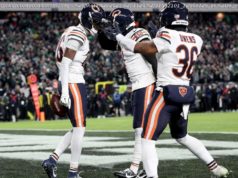Perhaps Mr. Market feared the impending arrival of Hurricane Florence. But not long after the market opened, a fresh China trade rumor hit the tape.
WASHINGTON. The Dow Jones Industrial Average (DJIA) looked toward the negative prior to Wednesday’s opening bell. Perhaps Mr. Market feared the impending arrival of Hurricane Florence. But not long after the market opened, a fresh China trade rumor hit the tape. The Dow took a modest bounce upward, despite modest tumbles in the broader-based S&P 500 and the tech-heavy NASDAQ. In fact, the latter is currently off 0.50 percent as we pass the noon hour, having been down even more earlier in the session.
Tech is having second thoughts right now, after leading markets for much of 2018. Plus, while Apple (symbol: AAPL) is set to announce its fall lineup of new products tomorrow, it’s currently off roughly 1 percent on the day. Good news or bad, this stock tends to stumble just before, during, or just after making major announcements. We’ll see how the company fares on Thursday.
The Dow, on the other hand, is enjoying that upward bounce today after generally lagging the other averages since August morphed into September. That average – which consists of the 30 biggest U. S. industrial firms (now more broadly defined) – is more broadly influenced by international trade. That’s because these big firms do a lot of business abroad, as opposed to smaller companies. Thus, many companies in this average get the jitters when international trade problems arise. Like the current wave of tariffs. But today’s China trade rumor may give these companies a hand.
Just this morning, credible reports surfaced claiming the U. S. moved to re-ignite trade talks with China .
“Dow Jones reported, citing sources, that the U. S. is proposing a new round of talks with China in the near future. The report says the talks are aimed at getting bilateral economic negotiations back on track.”
This apparent move might be one result from China’s recent remarks that it would not likely target individual U. S. companies due to the current U. S.-China trade impasse. That sideways peace overture – perhaps influenced by Apple’s recent public worries about just such a company-specific move by China – might have been the opening U. S. trade negotiators needed to start talks with China once again.
Nothing has actually happened, of course. That China trade rumor is nice, yet not guaranteed. Even so, big manufacturing companies like Boeing (BA) and Caterpillar (CAT) leaped at the potentially positive news, and the DJIA leaped along with them. The DJIA currently (1 p.m. ET) stands at about 26072, up over 100 points on the day for a gain of about 0.4 percent. Trading isn’t over until the 4 p.m. ET bell. But America’s big industrial stocks seem happy so far.
Lurking around the edges of today’s market action is potentially more ominous news. The kind of news that even the mega-rich can’t influence. We’re talking about the impending arrival of Hurricane Florence. This large, Category 4 storm is slowly taking aim at the southeastern coastline of the U. S.
At the moment, it looks likely that Florence will strike the coast somewhere between Wilmington, North Carolina and Myrtle Beach, South Carolina. It’s hard to say exactly where, though, as the slow-moving storm seems to be drifting somewhat further south at the moment.
But whatever the case, TV’s weather gurus are leaping about like they’re on virtual or actual amphetamines. They, and most of the media, are leaping on the disaster bandwagon, probably hoping for more “proof” of global warming climate change. For that reason, it’s hard to really know how much of the “impending disaster” hype will actually come to pass.
Looking at the weather patterns on radar, it is indeed likely that this will be one juicy, rain-filled storm. That means that widespread flooding may actually occur, and it could be bad. The weather guys and gals are cheering for another Hurricane Harvey, which would guarantee a good 2-3 weeks of exciting disaster coverage. But who knows what will transpire, or where?
Earlier reports indicate that flooding rains are possible as far inland as the Appalachians once the storm makes landfall. But, depending on where it hits and how long it hangs around, a swath of the U. S. southeast, ranging right now from Savannah, Georgia to Baltimore, Maryland – including Washington, D. C. – could get hit. Emphasis, as always, on could.
Seasoned investors are, in once sense, amoral. Neither joy nor tragedy influence trading decisions. Logic does.
From a trading and investing standpoint, opportunists (like yours truly) may want to look at stocks that will make a lot of money after Florence takes its eventual leave. As we saw in the aftermath of Harvey, Home Depot (HD) could very well attract the same legion of buyers that showed up after that Texas coast disaster.
Ditto the somewhat less popular shares of Lowes (LOW) and the manic-depressive shares of the lesser known Generac (GNRC). The latter is a Wisconson-based manufacturer of industrial and retail generators. It has a tendency to generate big sales increases just prior to and during the landfall of nasty hurricanes, for obvious reasons.
GNRC already experienced a big jump earlier this week, although it’s getting hit today, likely by short-term profit taking. We know investors who routinely ride this stock, getting in around May or June, and bailing when hurricane season reaches its November conclusion.
We have been trying to pick up a few shares of GNRC, but it’s slippery this morning. However, we have acquired a small position in Lowes, a company we like anyway, even though it seems to be a constant also-ran when compared to Home Depot. Home Depot itself could be a good bet. But after a great run in 2017 and earlier this year, it might not be as good a buy as Lowes right now.
In any event, both DIY companies are likely to get extra business out of Florence. Generac may get a boost, too, although it may already have passed its latest hurricane rally. Today, investor decisions could ride on a “best guess” scenario. Both DIY outfits have been doing great business since Election 2016, however. So one or the other or both could be decent long-term holds as well.
Of course, as in any trading situation, in addition to winners, we find losers as well. The standard losers in natural disasters are generally property and casualty insurers plus the re-insurers who cover extended losses.
Start
United States
USA — Financial China trade rumor rallies Dow stocks, as Florence looms offshore






